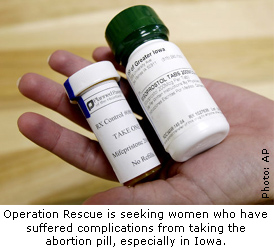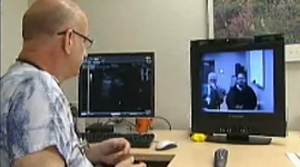
Des Moines, IA – Ten years after the abortion pill, RU 486, also known as Mifeprex or Mifepristol, was approved by the FDA, questions about its safety remain, especially in Iowa, where Planned Parenthood of the Heartland is dispensing an abortion drug combination via a remote controlled vending machine scheme known as telemed abortions that prevents patients being examined physically by a licensed physician or receiving adequate follow-up care.
Because of this, Operation Rescue is asking women who have suffered complications from medical abortions, especially in Iowa, to tell their stories.
Planned Parenthood of the Heartland, which is the first in the nation to employ the remote-controlled abortion pill distribution system, incredibly has told media that after 1,900 telemed abortions, there have been no complications.
“We know that is simply impossible. All this statement shows is that Planned Parenthood supplies such abysmal follow-up care that they are completely ignorant about what happens to women after they load them up with abortion pills and send them out the door to deal with the aftermath on their own,” said Operation Rescue spokesperson Cheryl Sullenger. “Planned Parenthood’s emergency plan is to tell the women to go to the emergency room if complications arise, then wash their hands of them.”
According to Planned Parenthood’s own statistics, 3-4% of women taking the abortion pill will suffer incomplete abortions that require surgery. The UPI reported on September 28, 2010, that the abortion pill’s incomplete abortion rate is actually eight percent.
That means out of 1,900 telemed abortions done by Planned Parenthood, there should be approximately 60-150 women who have suffered incomplete abortions requiring surgical intervention. Those numbers do not even take into consideration other known complications, such as excessive bleeding requiring surgery and serious infections that require immediate emergency care.
In addition, Planned Parenthood is prescribing Mifeprex through 9 weeks of pregnancy, two weeks beyond the safety limit set by the FDA. Along with Mifeprex, women are given a drug called Misoprostol, also known as Cytotec, a drug originally developed to treat ulcers. The manufacturer of Cytotec has warned women not to take the drug to induce abortions, a warning cavalierly disregarded by Planned Parenthood. These factors increase the risks of serious complications.
Operation Rescue has filed a complaint against Planned Parenthood’s telemed abortion scheme with the Iowa Board of Medicine. An investigation is underway. The IBM is scheduled to discuss public policy on telemedicine at a meeting on October 22.
“It is time for women who have suffered these complications to come forward and tell their stories so other women won’t have to suffer as they have. If necessary, we will protect the identity of anyone who wants to speak with us about their abortion pill experience,” said Sullenger.
Contact Operation Rescue at 316-683-6790 ext. 112 or send an e-mail to contact(at)operationrescue.org.

Select Page


